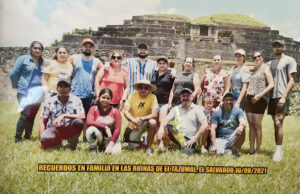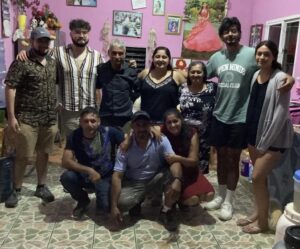My name is Albert Nova and I am a Latino student pursuing an environmental science degree at Rensselaer Polytechnic Institute. During my time at university, I have noticed a lack of representation from the Latino community in the STEM (Science, Technology, Engineering, and Math) field at my own school. As a result, I decided to take a deeper dive into this lack of representation. Latino, Latina, and Latin X students make up about 8% of people with STEM careers, despite being nearly 20% of the entire US student population. Even with private and public universities seeking more diverse student bodies, the Latino community remains quite a small group in the STEM universe. Why is this you might ask? To get a better understanding of why this is happening, I interviewed my mother, Sonia, a woman who was born and raised in El Salvador who also supported three first generation students through college.

A picture of Albert’s family in front of the Tazumal Ruins in El Salvador
In this interview I asked many questions to get a better understanding on the situation; the questions and responses are as followed:
As a Latina, what is your view on pursuing a greater education?
For my mother, education is seen as an opportunity to be successful. She believes that without education, it is harder to make it in life. You have to work more intense jobs, most likely some sort of hard labor, and will be given less opportunities. For her, greater education is the key to being successful in life.
What percentage of people do you know share this view?
My mother is acquainted with many different people from the Latino community coming from many different economic statuses. Out of all the people she knows, she claimed that about 50% of them support the pursuit of greater education. Most of the people who don’t pursue education tend to be from families that speak English poorly. They especially struggle to understand the importance of education, where to start, and how to pursue it. A lot of times, the parents of possible first generation students grow up in a third world country where all they know is grinding work. My mother says that she and everyone else around her went to school up until third grade because that’s all that was offered. Unless you live in a big city, which is rare in El Salvador, you are most likely in this situation as well. Often, education is seen as a dream not accessible to them, causing a similar mentality once in the United States.
What are some common views on college and university?
One thing that my mother stressed is that it’s not that people of the Latino community don’t want their children to pursue STEM, it’s that they are scared there’s no work in the major that they are choosing. Most people they know have never experienced college, so they have no idea what kind of career you can get with a biology or mechanical engineering degree. For the Latino community, they feel that colleges and universities don’t give the necessary information regarding career paths, it is something that students are expected to know going in. They are terrified of spending thousands of dollars on education, just to work a full time job completely irrelevant to their degree.
Why do you think there is such a lack of Latino representation in STEM?
Once again, my mother said that it’s not that Latinos don’t want to pursue STEM, it’s the lack of information available to them. All they see is a $70k per year price. They don’t know that scholarships are available to help pay for the massive cost of tuition, room, and board.
Along with this, a lot of families in the Latino community rely on their children to work starting in highschool to help pay for bills, groceries, clothes, and any other necessities. To them, pursuing STEM is a waste of 4 years. They could be working instead making money for the family.
Along with this, STEM majors are considered to be very difficult. Even with the support of your family, it is very daunting to choose a major that you know has a difficult work load. For those Latinos that do go to university, they opt out for a major such as business, which is known for having a straightforward career path and lighter workload.
In the end, most Latinos at this point in time that pursue STEM are first generation. They are very new to this type of environment and have no idea what to expect.

Albert’s family
How has being Latina impacted you and your sons pursuing STEM?
My mother’s first language is Spanish. She didn’t learn English until she moved to the United States, and even then she didn’t speak it very well. Now she is much more fluent when it comes to speaking, but literature is still very difficult. Applying to college and university requires a lot of paperwork that needs to be read over, signed, and returned. This paperwork is also written in a very formal way that is even tricky for native English speakers to understand. Along with this, you have to apply for financial aid through FAFSA which is a whole other process. All this paperwork becomes very daunting, and often members of the Latino community would rather not deal with it.
Do you think the lack of representation in STEM from the Latino community can be fixed?
Sonia is very hopeful for the future. She says that every year she sees more and more children from the Latino community getting excited about pursuing STEM. The only thing we need is more information. She said, “We don’t want to ask for help because it is embarrassing. We are already discriminated against for our broken English and our accents, we don’t want to be looked down upon more than we already are.” Despite this, she looks forward to the future, where hopefully the number of STEM majors in the Latino community increases.
Here at NSTEM, we are lucky to be connected with some amazing people who contribute a tremendous amount to the STEM world. They also just so happen to be Latino! Dr. José Morey is the CEO and founder of Ad Astra Media LLC. He is also a consultant for NASA, Forbes, MIT, and the White House Office of Science and Technology. Dr. Morey is an Advisory Council member for NSTEM alongside José A. Marquez-Leon, the national president and CEO of Tech Latino.
Tech Latino is responsible for offering programs designed to introduce technology into classrooms, encouraging the STEM pathway to young adults! Mr. Marquez holds many awards for his work and is an amazing leader for the Latino community.
If you would like to find out more about these two fantastic advisors, please visit their LinkedIn which can be found here for Dr. Morey and here for Mr. Marquez.
With these two advisors by our side, we hope to help combat the lack of the Latino community within STEM!
Written by Albert Nova

